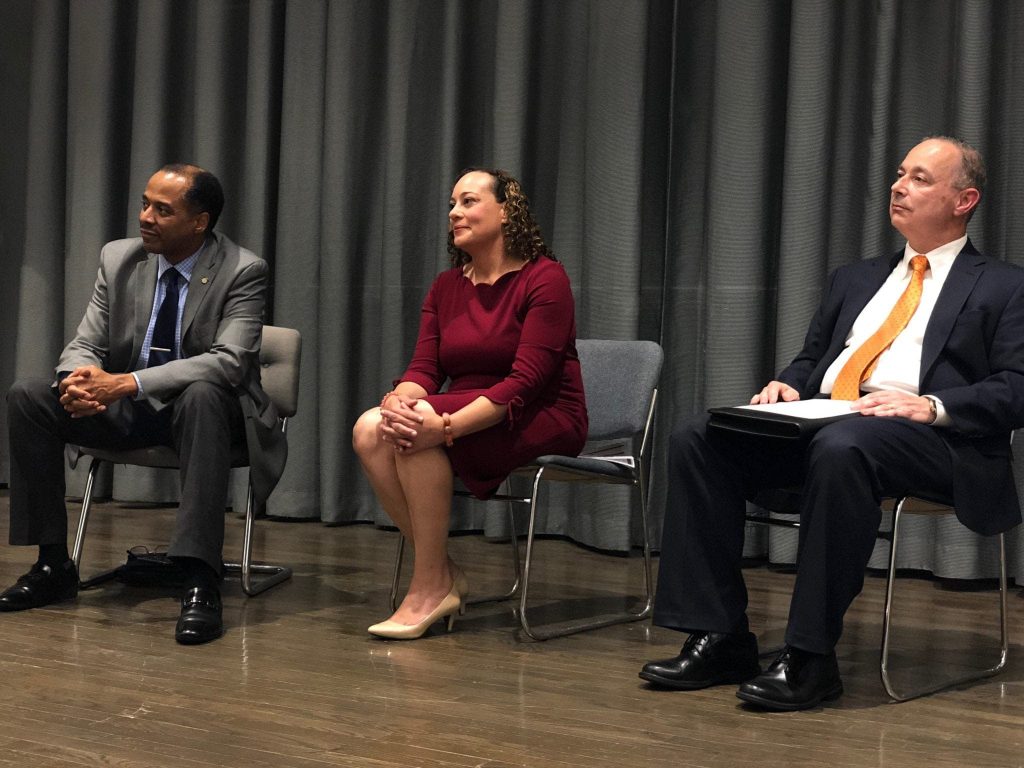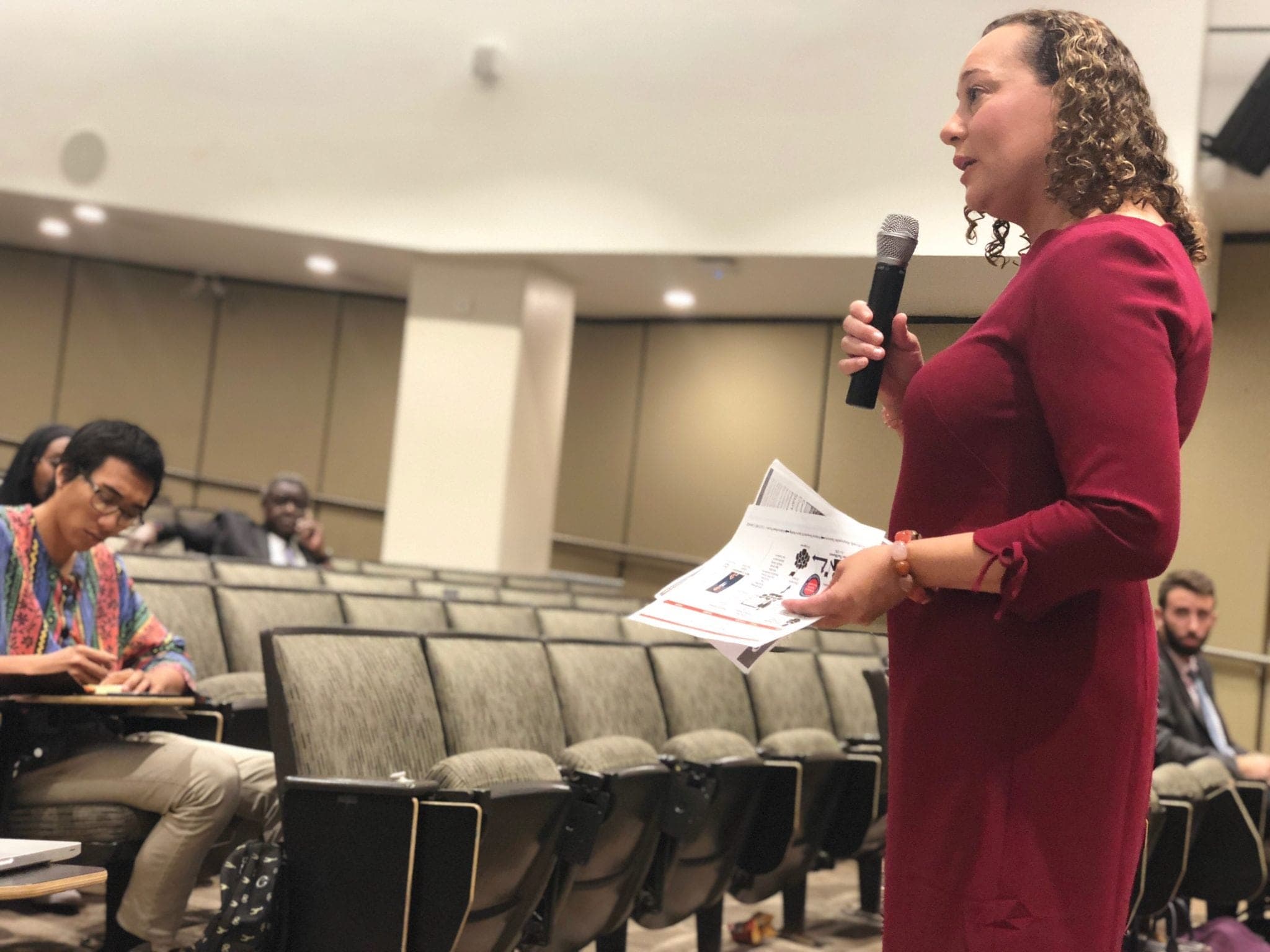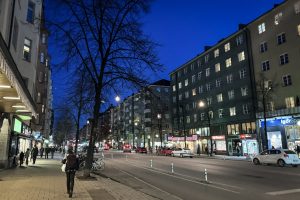Student Association hosts town hall meeting on diversity
Student Association hosts town hall meeting on diversity

On Wednesday evening, the Student Association hosted a town hall meeting in HBC Gifford in an effort to inform students about the progress Syracuse University made over the summer to cultivate a more inclusive campus environment.
Though there were a number of University officials in attendance, the panel itself consisted of Kira Reed, provost faculty fellow and co-chair of the First Year Experience initiative steering committee, interim Chief Diversity Officer Keith Alford and Robert Hradsky, senior associate vice president and dean of students.
Throughout the course of the discussion, the administrators answered several student’s questions about how the administration plans to tackle issues of diversity within the University’s institutions, staff, student body and Greek community.
Alford, who was appointed to his interim post last spring, highlighted the initiatives that have been implemented to create a more diverse faculty by fine-tuning the hiring process and working with faculty who are already part of the university to ensure that they are echoing the SU’s values of inclusivity.
Alford says there have been a number of workshops hosted in an effort to help the faculty understand how to combat biases on campus.
“That is my quest, as interim Chief Diversity Officer is to ensure that the value of all members of Syracuse University is held to the highest degree,” Alford said.

Reed, a management associate professor who is pioneering the first-year diversity forum, went on to introduce a proposed year-long seminar entitled “Identity, Inequality and Inclusion” which, if approved, will be open to first-year and transfer students and be a permanent course offering. In revamping this first-year experience, Reed says that the primary goal is to create a sense of community, add more voices to the equation and create a unified front.
Currently, SU only offers SEM 100, a 5-week course based on Trevor Noah’s book Born a Crime. The course was designed to allow students to meet other individuals on campus and across disciplines. This structure consists of a relationship between facilitators, peer facilitators and discussion groups who unpack the issues within the book and create a sense of understanding about how they impact SU’s campus.
“This isn’t just about Theta Tau … it’s not even about just diversity, it’s about embracing who we are despite the discipline that we’re teaching and about embracing our students and how it impacts how we communicate with each other,” Reed said. “This incident was just a symptom of what needed to happen anyway.”
The third and final SU administrator on the panel was Hradsky, who shed light on the measures being taken to improve the student experience, especially within the Greek community.
Hradsky said the process is ongoing. One of the initiatives taken was the distribution of an online Greek life survey, created by national experts, that was made available to undergraduate students for a short time in August. Hradsky says the survey was a great success, having a 48 percent response rate from students.
Though the results of the survey have not yet been published, Hradsky emphasized the University’s desire to maintain a sense of transparency. The findings of the survey are expected to be published, but Hradsky did not provide a definitive date.
In addition to conducting the survey, these consultants visited the University in mid-September during Juice Jam to observe the social climate on campus.
One student in the audience expressed his concern for the lack of resources available to students at the counseling center, a topic that has sparked a great deal of controversy on campus and has been a point of contention for members of the RecognizeUs Movement.
Hradsky reassured the students that progress has already been made by hiring more staff for the counseling center, where the wait-time for individual appointments has been cut in half. Students now have access to one-on-one care, as well as long-term care.
In addition to these changes to existing institutions within the University, Hradsky says they also hope to adopt a holistic approach that will prioritize health and wellness through the Barnes Center at the Arch which is set to be completed fall 2019.
Toward the end of the meeting, a student compared the events of the last few months to instances that have occurred throughout his academic career at SU.
“History doesn’t repeat itsel – it rhymes,” a student said during the talk. “How do we get students to care about issues that affect them?”
Alford suggested that the overarching solution is student involvement in these initiatives and task forces.
“We want to hear from students,” Alford said. “We want to make sure that we’re meeting every need so that we aren’t leaving a stone unturned.”





